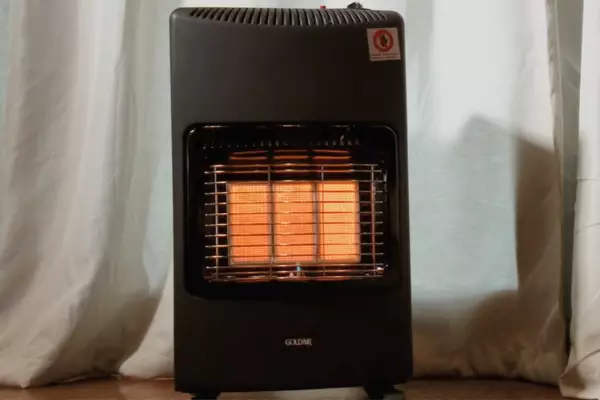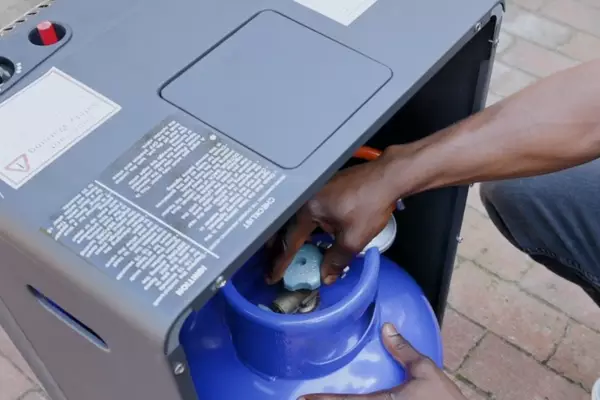Gas heaters stand as a popular choice for those in need of an efficient, cost-effective heating solution. They’ve established a solid footing in the market, offering several advantages over other heating options.
A key question that consumers often ponder on is – how much gas does a heater consume? It’s a question of efficiency, operation costs, and overall environmental impact.
The topic of gas consumption is especially important considering the current focus on energy conservation and minimizing carbon footprints. Now, let’s explore this vital question about gas heaters.
Contents
Gas Heater Types
Variety in the Market
Gas heaters are versatile and come in different shapes and sizes, offering the advantage of selection according to your unique needs. The common types are:
- Radiant Heaters: They use infrared energy to produce heat. Ideal for small rooms, these heaters warm up objects and people directly in their path. These are also a great outdoor solution for patios.
- Convection Heaters: These circulate hot air around the room, making them ideal for larger spaces. They take longer to heat but provide warmth for an extended time.
- Forced Air Heaters: These use a fan to push heated air into the room. They heat up quickly and are ideal for quickly warming up larger spaces.
Each type serves different needs and comes with varied energy consumption rates.

Gas Wall Heaters
Gas wall heaters are a particular type of convection heaters that stand out for their space-efficient design. Here’s what makes them unique:
- Space-saving: These are installed directly into the wall, making them ideal for homes with limited floor space.
- Efficient Heating: Gas wall heaters draw in cool air from the room, heat it internally, and then disperse the warm air back into the room. This circulation ensures even and efficient heating.
- Aesthetic Appeal: Modern gas wall heaters come in a variety of designs and can blend seamlessly into your home decor.
Gas Heater Consumption
Fuel Consumption Factors
Numerous variables can affect gas heater consumption. These include:
- Type and Model of Heater: Different heaters use gas at different rates. The specifications of your heater will significantly impact its fuel consumption.
- Size of the Heater: Larger heaters typically consume more gas than smaller ones.
- Usage: The more frequently you use your heater, the more gas it will consume.
- Home Insulation: Homes with poor insulation will lose heat more rapidly, causing the heater to work harder and consume more gas.
How Much Gas Does a Gas Heater Use
The gas consumption of heaters can vary widely. For instance, a small gas wall heater may consume approximately 1,000 BTUs per hour. In contrast, larger central heating units can use anywhere up to 100,000 BTUs per hour. It’s crucial to check the product specifications or consult with the manufacturer to get an accurate estimate.

Cost Factors
Wall Heater Running Costs
Operating a gas wall heater incurs costs, primarily for the gas it consumes. Here’s how you can estimate the running cost:
- Determine Gas Consumption: Refer to your heater’s product specifications to find out its hourly BTU consumption.
- Check Local Gas Prices: The cost of natural gas or propane can vary by location.
- Calculate Cost: Multiply the heater’s hourly BTU consumption by the price of gas per BTU to get the hourly running cost.
Wall Heater Installation Cost
The installation cost of gas wall heaters can vary widely. Factors influencing installation cost include:
- Complexity of Installation: Installing a gas wall heater may require modifications to your home, like creating a recess in the wall or installing new gas lines.
- Model of the Heater: Different models might require different installation processes, affecting the cost.
- Professional Installation: Hiring a professional installer is highly recommended for safety and efficiency, but this will add to the total cost.
Energy Efficiency Tips
Economical Heater Usage
Using your gas heater efficiently can help you reduce consumption and save on running costs. Here are some tips:
- Set a Reasonable Thermostat Level: Lowering your thermostat by a few degrees can significantly reduce gas consumption.
- Use a Programmable Thermostat: These devices can automatically adjust the temperature according to your schedule, avoiding unnecessary heating.
- Ensure Proper Insulation: Proper insulation keeps the heat in, reducing the workload on your heater.
- Regular Maintenance: Keeping your heater in good working condition ensures it operates at maximum efficiency.
Frequently Asked Questions
What type of gas do gas heaters use?
Gas heaters are versatile and can operate on either natural gas or liquid propane. The type of gas you use will depend on what is most readily available and affordable in your area. Both types of gas are viable energy sources, but there can be differences in cost, availability, and energy efficiency:
- Natural Gas: It’s widely available in many areas, especially urban and suburban areas. Natural gas is typically less expensive compared to liquid propane and is considered a clean-burning fossil fuel.
- Liquid Propane: This type of gas is commonly used in rural areas where natural gas lines may not reach. While it’s typically more expensive than natural gas, propane can produce about twice the heat per cubic foot. Hence, it’s quite efficient.
Does using a gas heater contribute to carbon emissions?
Yes, burning any fossil fuel, including the natural gas or liquid propane used in gas heaters, results in the release of carbon dioxide, a greenhouse gas. However, it’s worth noting that natural gas heaters emit 45-50% less carbon dioxide compared to coal or oil heaters. To minimize your carbon footprint:
- Use Energy Efficient Appliances: Energy Star-rated appliances use less fuel and are thus more environmentally friendly.
- Ensure Proper Insulation: Better insulation means less energy consumption and lower emissions.
- Regular Maintenance: Keeping your gas heater in good working condition ensures it burns fuel as cleanly and efficiently as possible.
Can I install a gas wall heater myself?
While technically possible, it’s generally safer and more efficient to have a professional install a gas wall heater. Here’s why:
- Safety: Improper installation can lead to gas leaks, fire hazards, or inefficient operation. Professionals are trained to avoid these issues.
- Efficiency: A properly installed gas heater performs at its best, providing optimal heat output and gas consumption.
- Compliance: Professionals are aware of local building codes and regulations, ensuring your installation is compliant.
Conclusion
Gas heaters, particularly wall heaters, offer an attractive combination of efficiency, practicality, and cost-effectiveness. They can provide a reliable heating solution for various spaces, from compact apartments to sprawling homes.
The intricacies of gas consumption and the associated costs of using a gas heater are significant yet manageable. Being well-versed in these areas can empower consumers to make informed choices, manage their energy usage better, and even reduce their environmental impact.
Grasping the nuances of gas heater consumption extends beyond mere product knowledge. It paves the way towards an environmentally conscious lifestyle marked by energy efficiency and cost-effectiveness. This approach aligns well with the global drive towards sustainable living while ensuring comfort and warmth in our living spaces.

